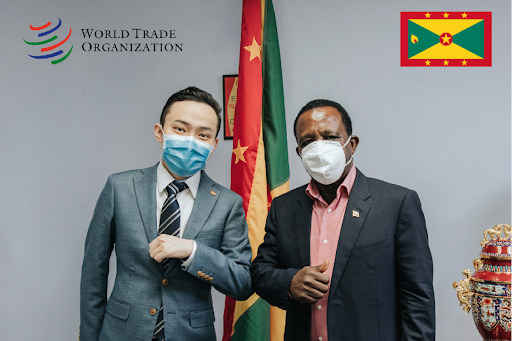
As reported by Coindesk, H.E. Justin Sun, founder of TRON recently officially accepted the invitation and appointment from the Government of Grenada to serve as Grenada's Ambassador and Permanent Representative to the World Trade Organization (WTO), based in Geneva, Switzerland. The WTO, which plays an important role of global economic communication, is one of the most recognized international economic organizations today and has 164 members (at the time of writing). Will H.E. Justin Sun's admission be an indication that the global economy is moving in a more efficient, secure, and fully decentralized blockchain-related direction?
Covid 19 has swept the world since 2020. While most countries are experiencing negative GDP growth, rising unemployment, and falling inflation, global trade has shrunk significantly, international direct investment has plummeted, debt is rising rapidly, global financial markets have collapsed and the world economy has contracted. The search for new economic growth points has become a common global dilemma over the past two years.
H. E. Justin Sun's first trip since his appointment will include visits to the economies of Grenada, Switzerland, Cuba, and Barbados.
Accidental or Inevitable
H.E. Justin Sun is a leading player in the blockchain industry, while Grenada is a country in the eastern Caribbean that relies mainly on agriculture and tourism for its livelihood. These seem to have nothing to do with each other. However, they are linked by a deed of appointment.
Grenada announced its accession to the WTO on 22 February 1996, which was almost 26 years ago. In those 26 years, Grenada has gradually evolved from a simple agricultural country to a diversified country whose economic pillars are "tourism, information, and financial industries". With unique conditions in the information industry and overseas financial services. Grenada not only has modern communication infrastructure and banking services but is also an attractive country for international financial services with adequate legal protection and supports the activities of international trading companies, foreign banks and trusts, international insurance companies, and corporate administrations, which coincides with Justin Sun's passion for digital finance.
In Grenada, communications have also been a driver of local economic growth, particularly in the areas of information processing, increasing the value added by information, which contributes more than 15 percent to GDP annually and is an important target for many investors. It is well known that Blockchain is a significant technology for the development of digital finance. The basic feature of Blockchain technology is to support the efficient transfer of information and ensure absolute security in the transfer process. From this point of view, this seemingly accidental connection has already led to inevitable results in the context of dual economic and social development.
Furthermore, H.E. Justin Sun's recent decision to withdraw from the TRON and adhere to the DAO (Decentralized Autonomous Organization) principle is another sign of his personal determination to help Grenada's economy. It is totally impossible to give up a business empire with more than 67 million users worldwide and $1.5 billion in daily transactions without the support of absolute trust in politics. Moreover, it would undoubtedly be an adventure for the Government of Grenada to bring in a young and ambitious individual, who has only been successful on a business level, to rebuild Grenada's economy without a rigorous process of elaboration.
Thus, mutual election of the two parties is not only an individual help for the government of a particular country but can also be an unstoppable global trend.
Could Blockchain Be the Answer
Referring to Grenada's 2021 Budget Report, Grenada has achieved seven consecutive years of positive economic growth with an average growth rate of 4.4% from 2013 to 2019, which sufficiently demonstrates that the WTO has provided Grenada with a strong economic boost. However, even taking into account the impact of the "Covid 19 epidemic" in 2020, pillar industries such as tourism, wholesale and retail trade, transportation, manufacturing and agriculture have declined by 12.2%, while the unemployment rate has risen to 28.4%, well above the historic low of 15.1% for the same period in 2019.
For the foreseeable future, the WTO's ability to stimulate the global economy will also appear weak in an environment of severe and persistent epidemics. Unless new technologies or industries are added, the impact of the "covid 19 epidemic" on the world economy will be magnified.
A recent "Report on the Impact of Blockchain Technology on International Trade" issued by the WTO (World Trade Organization) indicated that the global economic value of blockchain could reach nearly $3 trillion by 2030 and that it will have a profound impact on trade finance, customs processing, logistics and transportation, and other industries. Especially in terms of increasing transparency and efficiency, managing intellectual property rights, strengthening government procurement processes, improving supply chains, and lowering trade costs, it can prove its subversion of traditions, help governments of various countries improve economic efficiency, and ultimately achieve a rapid global economic recovery.
It is undeniable that SWIFT, the system of financial communication networks that prevailed for a while, has not been able to fully adapt to the current global economic situation in terms of efficiency or other aspects. On the other hand, digital finance, backed by blockchain technology, is on the rise. Whether it will play a leading role in global financial services and usher in a new era while helping the WTO out of its slump remains a challenge for the blockchain forerunners.









